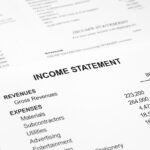Avoiding Costly Mistakes: Common Accounting Errors
Accounting errors often happen innocently. In fact, out of the 64% of small business owners using DIY accounting, it’s not uncommon for some to miscategorize a transaction. Over time, these can add up and create major issues that impact the health of your business, cause you to make poor decisions and lead to significant financial ramifications.
At Redmond Accounting, we love technology. Technology can help reduce errors, but it too can cause costly mistakes if it’s not set up or used properly.
In this guide, we will explore the types of errors in accounting that you need to be aware of to prevent them in the future.
5 Common Accounting Errors That Can Derail Your Business
1. Ignoring Record-keeping Organization
Record-keeping is an important part of running a business. Digital records eliminate the need for towering filing cabinets, but that doesn’t mean that your documents do not need to be organized. For example, if you use Expensify, you know how easy it makes scanning receipts.
However, you need receipts to go into the right category:
- Entertainment
- Office supplies
- Equipment
- Etc.
If you haven’t already added categories in Expensify, you can get started by navigating to Settings > Policies.
The reason why it’s so important to have proper organization of your records because you may miss deductions or miscategorize them, and if you’re ever subject to an audit, it will make the process more stressful.
2. Miscategorizing Employees and Contractors
Are your employees being categorized as independent contractors? If so, the punishment can be harsh. Employees are subject to the Fair Labor Standard Act, meaning they’re entitled to minimum wage and overtime protection.
There are big differences between contractors and employees. For example, contractors handle their own self-employment tax and taxes. Employees have their income taxes withheld by your business, as well as Medicare and Social Security. The consequences of a miscategorization can be serious.If you fail to categorize these workers properly, you may be penalized in a few ways:
- $50 for each W-2 that you failed to file
- Up to 3% of the employee’s wages
- Up to 40% of FICA taxes
- Up to 100% of matching FICA
Willful misclassification can be very costly, and you may be assessed additional fines as a result. If you don’t know how to classify a worker, it’s best to work with a professional to clarify their classification.
3. Going Long Periods of Time Without Bank Reconciliations
When you want to validate all of the information in your books, bank reconciliations are what you need to perform. A reconciliation will check the books against your external credit card or bank statements, and then you can find accounting errors or even internal fraud.
If you go too long between bank reconciliations, you can allow small errors or oversights to grow into major issues. At Redmond Accounting, we recommend reconciling your bank and credit accounts every month.
A few minutes is all it takes to do this in QuickBooks Online or any other platform you may be using. If you’re using QBO, simply:
- Tap on Settings
- Hit Reconcile
- Compare the statements with your transactions
P.S. Be sure to reconcile your loan accounts, too.
4. Forgetting to Account for Petty Cash
Small, insignificant expenses are easily overlooked. If you pay cash for many items, it’s easy to forget to record these payments. Imagine buying a notebook for the office. It’s easy to forget about a $1 – $2 fee.
You want to pay attention to small cash purchases for a few reasons. First, you can write off many of these items and save money on your taxes. Further, if you make it a point to track small expenses, you’re also training yourself to log all of your future debits as your business grows.
5. Balance Sheet Recording Errors
Bookkeepers are an invaluable asset to a business. The experience of these professionals helps to eliminate one of the most common accounting errors: putting balance sheet items on your P&L.
A P&L (profit and loss) statement should include your revenue and expenses for the reporting period.
Balance sheets should contain your assets, equity and liabilities at the time of the report. One error that small business owners tend to make is recording liability payments as business expenses or reporting a loan as income.
Working with a bookkeeper will keep these discrepancies from occurring and allow you to better understand your business’s finances.
The Bottom Line
Once you know better, you can do better. That’s why it’s vital you’re aware of the most common types of accounting errors. Once you have the right systems in place and checks and balances to avoid these mistakes, you’ll find technology can save you a lot of time and money when growing your business.
To learn more about common accounting errors or how we can help you with your accounting needs, schedule a consultation now.










